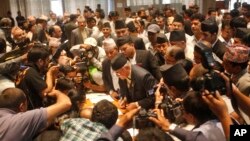Nepal plunged into a new political crisis on Wednesday after the main Maoist party that props up the ruling coalition said it would form a new government, leaving Prime Minister K.P. Oli isolated and at imminent risk of losing power.
Oli, 64, rose to power with the backing of the Maoists last October after promising to resolve protests against a new constitution by southern plains dwellers and to step up efforts to rebuild homes destroyed by last year's massive earthquakes.
Increasing public anger at Oli has led the Maoists – who waged a decade-long insurgency before joining mainstream politics in 2006 - to conclude that he was an obstacle to ending the Himalayan nation's constitutional standoff.
Minority Madhesis, who live mostly along Nepal's lowland border with India, imposed a four-month blockade in protest at a proposal to carve Nepal up into seven federal states. They say it would divide their homeland and deprive them of a fair say in running the country.
"Our party has decided to form the new government and we appeal to other political parties to help us resolve the outstanding political problems in the south through talks," said Narayan Kaji Shrestha, a leader of the unified Communist Party of Nepal (Maoist) that dominates Oli's unwieldy coalition.
Shrestha said the main opposition Nepali Congress party had offered to support Maoist leader Prachanda to replace Oli.
Kunda Dixit, editor of the Nepali Times weekly, said Prachanda could resolve the deadlock in the south by bringing the Madhesi parties and the Nepali Congress on board in a government that includes major stakeholders.
The Maoists said they were waiting for the response from Oli before withdrawing their ministers from the coalition.
Prakash Sharan Mahat, a Nepali Congress lawmaker, said his party was exploring alternatives to Oli, who he said had failed to deliver on his promises.
Oli's Unified Marxist-Leninist Party (UML) was not immediately available for comment. His grip on power has been in question for months.
Prachanda, who still goes by the nom-de-guerre he used in the Maoist insurgency that means "Fierce", will need the support of Oli's UML or must rally support from other smaller groups in Nepal's fragmented parliament to form a new government.
Nepal was hit by two massive earthquakes in April and May last year which left 9,000 people dead, 22,000 injured and one million houses destroyed.
International donors pledged $4.1 billion for quake reconstruction in June but most of the money remains unspent due to political squabbling.





